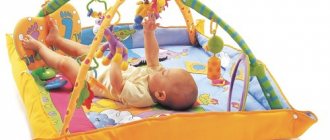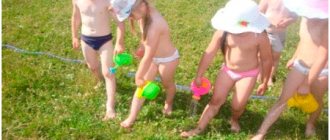All parents try to harmoniously raise and develop their child, and from a certain age, a kindergarten helps them carry out this function. Children who have reached the age of three begin to need to communicate outside the family and begin to become interested in their peers. It is in the garden that the child finds a second team after the family, where it is necessary to learn to demonstrate the ability to communicate, find compromises and mutual assistance.
In addition, the development of children in kindergarten includes cognitive, physical education, health, artistic and aesthetic education, which guarantees the child a comprehensive knowledge of the world around him and preparation for entering school. During this period, children undergo a rapid formation of basic psycho-emotional processes, and correctly selected methods of education in kindergarten ensure a comfortable acquaintance of the child with the environment in which he will live and develop.
Objectives of preschool education
• Formation in the child of personal qualities that are necessary for a comfortable stay in a team. It is, being in his first society, that the child learns to understand those around him, empathize with them, express his point of view and defend it correctly, without infringing on the interests of others. • Promote the healthy physical development of the child, for which various methods are used, including active games in the fresh air, choreography, swimming and other physical exercises. • Development of linguistic skills in a child, which include expanding vocabulary, improving the purity of pronunciation of sounds, correct placement of stress, the ability to clearly formulate thoughts and expressively read poetry, as well as learning foreign languages. • Development of the child’s aesthetic perception, the ability to listen to fairy tales and music, as well as to show interest in creativity and drawing. In addition, an important task is to teach children to notice the beauty of the world around them, cherish it and protect it. • Consider in the child his abilities, and possibly the talents that he has, and contribute to their development.
What do kindergarten classes give a child?
Today, the desire to send a child to kindergarten is not a whim of parents, but a necessity. The modern world is so dynamic that there is no time to stay late on maternity leave with diapers and nappies. And as soon as the baby shows the first signs of independence, he is immediately sent to kindergarten . And even more often, they leave it on all day.
Modern mothers are very smart and comprehensively erudite, but not every one of them is able to convey to the child all the necessary information and teach everything that is needed. And professional teachers in kindergartens will very quickly and easily teach your child to draw basic elements, distinguish colors, name animals, plants, and food products. Educators are called upon to give the child the knowledge base with which he will go to first grade. And the mother may simply not have enough time, patience or teaching abilities for all this. During kindergarten classes, children learn so much new and useful information that parents can only be proud and admire their child. In a light playful way, teachers teach children the rules of behavior and the basics of etiquette.
In addition, not only classes in kindergarten are designed to develop children. To train memory and speech, teachers use thematic poems and scenarios for children. At holidays and matinees, little actors transform themselves with ease and genuine interest: in the fall into carrots and cucumbers, in the winter into snowflakes, bunnies and butterflies, in the spring into snowdrops and streams. Kids learn poems about animals, about the seasons, thereby filling their bright heads with new knowledge, they develop an understanding of specific life moments (a bunny gives birth to babies, it snows in winter, all children have a mother and father).
Modern activities in kindergartens are very creative, this is no longer a banal sitting at a desk, but role-playing games, thematic skits, fairy tales performed in roles, performances of puppet theaters and dance studios right in the kindergarten. So, when sending their baby to teachers, parents can be calm, he will not languish from boredom. Everything will be very good.
After a few months of regular visits to kindergarten, parents will notice how independent and responsible the child becomes. He eats himself, gets dressed in the morning, and cleans up his toys. In addition, children get used to saying hello and goodbye, and saying thank you. Discipline becomes the basis of their behavior not only in kindergarten, but also at home, as well as in public places.
Author of the article: Spasibova Yulia Aleksandrovna
Kindergarten education programs
A professional educator must support the child during adaptation to the new world, create comfortable conditions for a smooth integration into the team and, at the same time, help him realize himself in this small society. For this purpose, various programs and methods are being developed for which kindergarten teachers work.
Currently, education programs are based on popular educational methodologies that have been tested by practice and time. These include the methods of Doman, Nikitin, Montessori, Zaitsev, Steiner and others. Each of them offers a special system of upbringing and education of children: • the Doman system is based on the principles of early mental development due to active physical development; • the Nikitin system is to offer the child activities that are a little more difficult than his capabilities allow, thereby acting proactively; • the Montessori method is based on the personal approach of the teacher to each child, who chooses the activity and its duration, developing in a rhythm that is comfortable for him; • Zaitsev's development method involves following the logic of the child's perception of sounds and a complete rejection of classical methods of mastering reading; • Steiner's system is a pedagogical system based on the knowledge of feelings, imaginative thinking and empathy.
Some kindergartens practice comprehensive child development programs. There are really a lot of work plans and schemes according to which children are raised; the task of parents is to choose for their child the optimal method that will be close and understandable to them, so that the child does not feel any contradictions in raising them at home and in kindergarten.
When choosing a kindergarten for their child, parents can find out the list of activities that are conducted with children, inspect the territory and premises of the kindergarten, and also get acquainted with the teachers, and only then decide whether this preschool institution and its development programs are suitable for their child.
Development of preschool children in kindergarten
Today, children are often sent to kindergarten from the age of two. Basically, the development of a child in kindergarten concerns the ability to communicate with peers, as well as with elders. During this period, he actively explores the world and expands his vocabulary, so the child must go to kindergarten even if one of the parents has the opportunity to spend the necessary time with him at home.
Of course, if the family’s financial budget allows, then it is better to send the child to a non-state kindergarten, since they provide highly qualified care services. In addition, in private kindergartens the group usually consists of 8-10 people. In public schools, the groups are very large, and it is more difficult for the child to adapt to the new environment.
How does a child develop in kindergarten?
In kindergarten, teachers teach a preschool child a very important skill that a person needs throughout his life. We are talking about the ability to engage in the learning process and remember the necessary new information, as well as attention. Research shows that children from the older group of kindergarten only need two to three minutes to get involved in the teaching process. Concentrating the attention of children from the junior and middle groups is much more difficult. The lesson should last no more than forty-five minutes or even half an hour, because then the child’s attention is significantly scattered, and the rest of the information will enter the brain in a much smaller volume. This is worth learning for parents who prefer to raise their children at home.
Love of work among preschool children in kindergarten
In addition, it is in kindergarten that a love of work is instilled in the child. Various crafts that children make together with their teacher develop their ability to work, aesthetic tastes, creative thinking and, of course, have a great positive effect on physical development. The child develops muscles and movements, replenishing his reserves with new ones, and blood circulation in the child’s body improves significantly. During the creative process, the child develops sensorimotor skills, in other words, coordination of eye and hand movements. This is very important because kindergarten will be followed by school, where it is very important to have the skill of coordinating finger movements. This skill is one of the main indicators of a child’s readiness for school. The development of a preschool child in kindergarten proceeds very quickly, so it is very important during this period to lay all the basic skills and abilities in him. It is necessary to have a specialist handle this process.
Any parents have a great responsibility in terms of raising their child, but kindergarten partly eases this burden by helping the father and mother develop the child’s vital base of abilities to learn information, and then be able to use it in the right situations.
They will teach you bad things
Proponents of home education, having decided to criticize kindergartens, first of all frighten parents by the fact that their children will bring home swear words. Indeed, this happens quite often, but this is not a reason to give up on preschool education. First of all, understand: curses are uttered by the same children. And your offspring may encounter little swearers anywhere: in the garden, at the circus, and even at the birthday party of your best friend’s son. Unfortunately, it is impossible to protect a child from bad words, so just explain to your child what profanity is and why it should not be used. But keep in mind: it’s stupid to convince your offspring that swearing is ugly if dad does it every day while talking on the phone with friends. If you do hear scolding from your treasure, react calmly and don’t focus on it.
Stars about kindergarten
Alika Smekhova - In kindergarten, children not only learn to read, write and draw, they are constantly in the company of their peers, which means they gain the necessary communication skills, the ability to resolve conflicts, and make friends. True, I didn’t immediately start leaving my son Artyom in kindergarten for the whole day. In the first days I brought him for a short time, gradually increasing the time of his stay. He soon got used to the new conditions and was able to stay there as long as he was supposed to.
Yana Poplavskaya – Every child needs to attend kindergarten. Knocks from classmates, the struggle for leadership - this is an important lesson in life. My children had nannies, but this did not in any way influence my decision to send my sons to kindergarten. And I also realized that a private establishment is not the best solution. The greenhouse conditions that are created there have nothing to do with the harsh reality. If you want your child to prepare for school, send him to a state institution.
Masha Rasputina - My daughter had nannies, but I had to refuse their services. Unfortunately, in Russia there are no institutions that would train bonnes and tutors, as in Europe. For this reason, most nannies working in our country are unprofessional people; they simply cannot give the child the necessary knowledge or proper attention. Therefore, it seems to me that it is better to send children to kindergartens. At least that's what I did.
They will offend you
Many mothers are sure that in kindergarten their baby will be hurt by bad children. Of course, a child may be faced with an offer: you give me a doll, and tomorrow I will bring you candy. But don’t rush to interfere, this is a life situation for which the baby must prepare in childhood. He has a million dubious proposals ahead of him, and the sooner he learns to make his own choice, the better for him. Let him lose his favorite toy today, but he will feel from his own experience what injustice is, and next time he is unlikely to get involved in such an adventure.
Try not to overprotect your child. Of course, a black eye or a broken nose is a sufficient reason to punish the perpetrators. But try not to take your son’s complaints about Vasya, who is taking away the scoop, to heart. If you scold your child’s classmates every day, he will not be able to fight back against offenders on his own, which is why sooner or later he will get the unflattering nickname “mama’s boy.”
Healthy competition
And of course, nowhere like in kindergarten will your offspring learn to communicate with other children. Imagine: a 6-year-old kid, accustomed to the one and only Natasha from the next door (and maybe a couple of your girlfriends’ children), suddenly finds himself in the company of 20 noisy and mischievous children who are constantly competing with each other for attention and chewing gum or a seat at a desk by the window. A child at home may become confused and withdrawn. In this case, you are guaranteed to visit a psychologist once a week. To avoid such a development of events, send your baby to kindergarten no later than 3-4 years. At this age, it will be easier for him to adapt: by the time he moves to the preparatory group, he will feel like a fish in water in the company of his peers.








